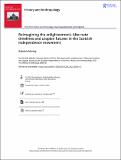Files in this item
Reimagining the enlightenment : alternate timelines and utopian futures in the Scottish independence movement
Item metadata
| dc.contributor.author | Manley, Gabriela | |
| dc.date.accessioned | 2022-04-04T14:30:04Z | |
| dc.date.available | 2022-04-04T14:30:04Z | |
| dc.date.issued | 2022-03-29 | |
| dc.identifier | 278392880 | |
| dc.identifier | dee10534-0850-4ad5-8e26-f5f02b8a5891 | |
| dc.identifier | 85127974388 | |
| dc.identifier | 000776331900001 | |
| dc.identifier.citation | Manley , G 2022 , ' Reimagining the enlightenment : alternate timelines and utopian futures in the Scottish independence movement ' , History and Anthropology , vol. Latest Articles . https://doi.org/10.1080/02757206.2022.2056167 | en |
| dc.identifier.issn | 0275-7206 | |
| dc.identifier.uri | https://hdl.handle.net/10023/25137 | |
| dc.description.abstract | This article explores how Scottish National Party (SNP) activists in Edinburgh reimagine the enlightenment past to provide alternate timelines that are appropriated in the projection of utopian futures for an independent Scotland. Starting with the question ‘what if history had happened differently?’, SNP activists harness the ‘what ifs’ and ‘would haves’ of alternate timelines where the enlightenment continues uninterrupted by the political union of Scotland and England. This approach facilitates a form of futural revisionism which captures the potentiality of the past to become utopian future without foregoing the SNP’s commitment to civic, rather than ethnic, nationalism. Thus, SNP activists are able to tow the party line of rejecting nostalgic historicism to remain open to all citizens of Scotland while still affectively engaging with the past to provide wishful utopian images for their independent future. | |
| dc.format.extent | 20 | |
| dc.format.extent | 1708076 | |
| dc.language.iso | eng | |
| dc.relation.ispartof | History and Anthropology | en |
| dc.subject | Utopia | en |
| dc.subject | Scotland | en |
| dc.subject | Independene | en |
| dc.subject | Time | en |
| dc.subject | Future | en |
| dc.subject | Enlightenment | en |
| dc.subject | DA Great Britain | en |
| dc.subject | T-NDAS | en |
| dc.subject.lcc | DA | en |
| dc.title | Reimagining the enlightenment : alternate timelines and utopian futures in the Scottish independence movement | en |
| dc.type | Journal article | en |
| dc.contributor.institution | University of St Andrews. Social Anthropology | en |
| dc.identifier.doi | 10.1080/02757206.2022.2056167 | |
| dc.description.status | Peer reviewed | en |
This item appears in the following Collection(s)
Items in the St Andrews Research Repository are protected by copyright, with all rights reserved, unless otherwise indicated.

